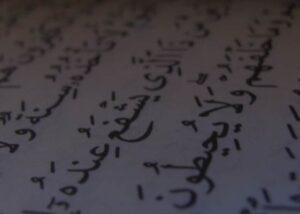Even if someone believes that voting is Haram, isn’t it permissible due to necessity? Because you are doing it to save your Deen.
Quran
Hadith
Islamic Text
بِسْمِ اللَّهِ الرَّحْمَنِ الرَّحِيمِ
In the Name of Allah Most Merciful Most Kind
Short Answer
Voting is permissible in Islam according to many scholars. There are many proofs from Quran and Sunnah to support this position. However, if someone does believe that it is Haram, then yes, the issue of necessity should be considered.
Explanation
إِنَّمَا حَرَّمَ عَلَيْكُمُ الْمَيْتَةَ وَالدَّمَ وَلَحْمَ الْخِنْزِيرِ وَمَا أُهِلَّ بِهِ لِغَيْرِ اللَّهِ فَمَنِ اضْطُرَّ غَيْرَ بَاغٍ وَلَا عَادٍ فَلَا إِثْمَ عَلَيْهِ إِنَّ اللَّهَ غَفُورٌ رَحِيمٌ
Indeed, that which is forbidden for you (includes) carrion, blood, the flesh of swine and that which is slaughtered (in the name of) other than Allah. But whoever is compelled, not out of desire or excess, then there is no sin upon him. Indeed Allah is All-Forgiving, Most-Merciful. (Surah al-Baqarah, 173).
Voting is permissible in Islam. However, some people argue against this an believe it is prohibited (Haram) in Islam. For this argument to be upheld or refuted, we must look to the Holy Quran and blessed Sunnah: Did the Prophets or other righteous people engage with local political authorities or systems in the absence of an Islamic system or not?
We have the example of Prophet Yusuf (peace be upon him), who clearly did engage. Also, al-Najashi not only engaged in, but he was the head of, a non-Islamic political system. Our blessed Prophet Muhammad ﷺ engaged with the crude tribal political system in Makkah. Of course, the politics at the time was tribal politics and not the same as many of the systems prevalent in the world today. Nevertheless, we can still find similarities.
Despite the above, for the purposes of this answer I will accept the premise that voting is prohibited in itself. In that case, is voting permissible in Islam due to necessity?
The verse above permits the consumption of Haram meat to preserve life. So could it be argued that voting should be permitted to preserve religious practice. This is because the preservation of the religion is superior to the preservation of life.
Genuine necessity permits the prohibited
الضَّرُورَاتُ تُبِيحُ الْمَحْظُورَاتِ. (المبسوط)
Necessities permit prohibitions. (Imam al-Sarakhsi 483H, al-Mabsoot).
In the Nass (text) above, we find the general principle that necessities permit prohibitions. Undoubtedly, there are many details and nuances to the legal maxim. And it cannot be applied by those who lack knowledge of Fiqh (Islamic law). However, it is an established principle in the Shariah. Therefore, it must be considered in relevant discussions. As a result, it cannot be dismissed without due consideration.
An example of the necessity of preserving religion permitting the prohibited is found in classical Hanafi Fiqh works. Early Hanafi scholars deemed it impermissible for Imams and Mu’adhins to take a wage. However, later scholars issued Fatwah that it is permitted in order to preserve the religion. This is a clear example of the concern for religious preservation permitting something that would not normally be permitted.
فأفتينا بجوازهما أيضاً لضرورة حفظ الدين. (إنقاذ الهالكين)
We issued Fatwah that they (taking a wage for being an Imam or Mu’adhin) are also permissible due to the necessity of preserving the religion. (Imam al-Birgivi 981H, Inqaadh al-Halikeen).
The example of Prophet Yusuf
The Nass (text) above makes it clear that religious necessities can permit something that is normally prohibited. We also see something similar in the example of Prophet Yusuf (peace be upon him). This is because he agreed to work in an non-Islamic political system so that some good can be achieved and some justice established.
وَمَنْ لَمْ يَحْكُمْ بِمَا أَنْزَلَ اللَّهُ فَأُولَئِكَ هُمُ الْكَافِرُونَ
And those who do not rule by that which Allah has revealed, they are the disbelievers. (Surah al-Maidah, 44).
فَإِنْ كَانَ الْمَلِكُ قَدْ أَسْلَمَ كَمَا رَوَى مُجَاهِدٌ فَلَا كَلَامَ، وَإِنْ كَانَ كَافِرًا وَلَا سَبِيلَ إِلَى الْحُكْمِ بِأَمْرِ اللَّهِ وَدَفْعِ الظُّلْمِ إِلَّا بِتَمْكِينِهِ، فَلِلْمُتَوَلِّي أَنْ يَسْتَظْهِرَ بِهِ. (البحر المحيط في التفسير)
If the king had converted to Islam, as Mujahid narrated, then there is no issue. However, if he was a disbeliever (Kafir) then if there is no way to establish the command of Allah and repel injustice except by empowering him, then the appointed may do so. (Imam Ibn Hayan al-Andalusi 745H, al-Bahr al-Muheet).
In the Nass (text) above, Imam Ibn Hayan mentions that a religious necessity can permit working in an non-Islamic political system. The religious necessity in question is to establish the command of Allah (Most High). In an non-Islamic political system, that cannot be done in entirety. However, the Muslim can attempt to align things more closely with the justice that Allah (Most High) has revealed.
As well as the example of the blessed Prophet Yusuf (peace be upon him), we have other examples in Quran and Hadith too.
The Najashi (king of Abyssinia) was actually at the head of an non-Islamic political system. This goes beyond what the blessed Prophet Yusuf done, as he was working within it. Yet, the Prophet Muhammad ﷺ praised Najashi and did not prohibit him from it.
This further proves that political engagement in an non-Islamic system is permitted to further religious goals. Therefore, voting is permissible in Islam if it is done to establish justice and align things more closely with the command of Allah Most High.
What is the necessity?
One may ask, what is the necessity? Why is it required for us to vote?
There is a very long list of answers to these questions.
However, I will keep it brief. Muslim children are being taught abhorrent things in schools. The pressure to do so often comes from the top. Therefore, Muslims need to address the issue with those leading the charge for this. Namely, politicians.
Muslims are losing their careers and jeopardising their livelihood for simply expressing opposition to sin. As a result, this lack of religious freedom is incredibly dangerous. It places a Muslim in an deeply perilous situation. Either he upholds his religious values or keeps his job.
I have known of situations where parents have been deemed extremist for mentioning basic facts in Islam. For example, the prohibition upon music. Subsequently, there was an attempt to take the children away.
The issue of Palestine is significant for Muslims and non-Muslims alike. The mainstream media and political leadership are united in supporting oppression. This must be challenged. A Muslim is not permitted to remain inactive in the face of such vile oppression. Amongst the most potent forms of activism against such tyranny is political activism.
Conclusion
Even if one believes that voting is Haram (prohibited), then consideration to necessity should be given. If such people accept that political engagement can help with some of the significant religious challenges we have in these lands, then they may accept that it is a necessity. Therefore, they may accept that voting is permissible in Islam due to necessity.
If one still maintains that voting is not permitted and thus trying to change the political reality we live under is impermissible, then I believe such a person must migrate. It is incredibly dangerous to live in a country that is increasingly hostile and restrictive regarding our religious practice. And if one believes that political engagement is Haram then he cannot work to change it. Then it seems he has no choice but migration.
And Allah Most High Knows Best.
–Answered by Shaykh Noorud-deen Rashid (08.05.24)
–Approved by Shaykh Mazin Bakeer (Damascus, Syria)






